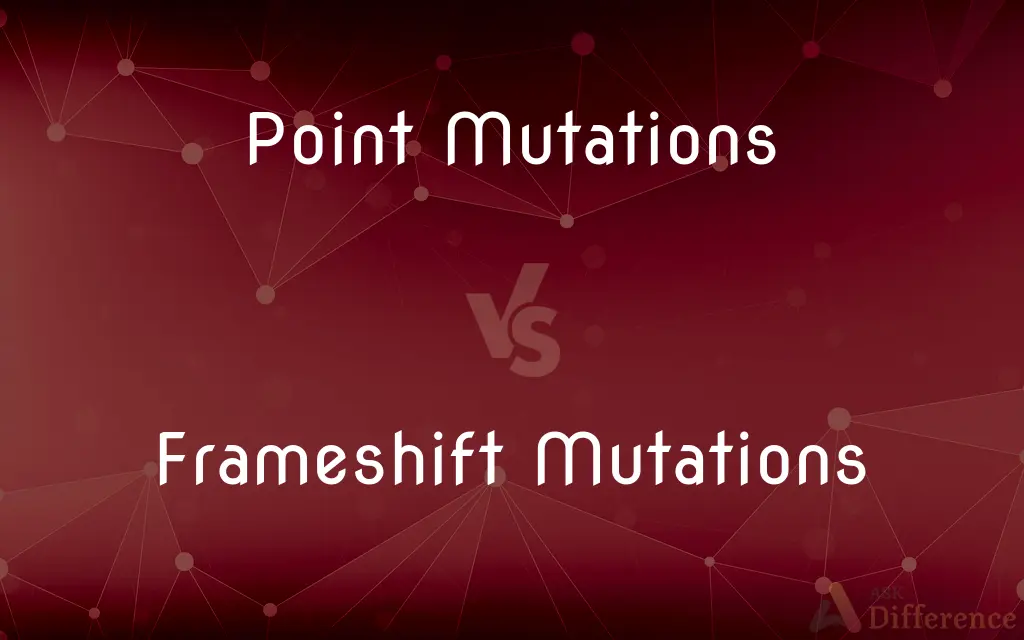Point Mutations vs. Frameshift Mutations — What's the Difference?
Edited by Tayyaba Rehman — By Fiza Rafique — Published on January 18, 2024
Point Mutations are changes at a single point in the DNA sequence, while Frameshift Mutations involve insertions or deletions that shift the reading frame of the genetic code.

Difference Between Point Mutations and Frameshift Mutations
Table of Contents
ADVERTISEMENT
Key Differences
Point Mutations involve the alteration of a single nucleotide. These changes include substitutions where one base is replaced by another. Frameshift Mutations are caused by insertions or deletions of a number of nucleotides not divisible by three, altering the entire downstream reading frame.
Both Point Mutations and Frameshift Mutations can result in changes in the amino acid sequence of proteins. Point Mutations might cause a silent mutation with no change in protein, or a missense or nonsense mutation. Frameshift Mutations usually result in a completely different and often nonfunctional protein.
The impacts of Point Mutations can be less severe compared to Frameshift Mutations. This is because Point Mutations affect only one amino acid, whereas Frameshift Mutations can change every amino acid that follows the mutation site, often leading to a nonfunctional protein.
Point Mutations are common and can be caused by errors during DNA replication. Frameshift Mutations are also a result of replication errors or mutagens but can have more drastic effects due to the change in the reading frame of the genetic code.
Comparison Chart
Definition
Change in a single nucleotide base.
Insertion or deletion of bases altering the reading frame.
ADVERTISEMENT
Resulting Protein Change
May alter one amino acid or none (silent mutation).
Usually alters the entire protein from the mutation point.
Genetic Stability
Generally less disruptive to genetic stability.
Often more disruptive due to extensive amino acid changes.
Frequency in Nature
More common than frameshift mutations.
Less common but with more severe consequences.
Types
Silent, missense, nonsense.
Usually results in premature stop codon or elongated protein.
Compare with Definitions
Point Mutations
Point Mutations can lead to a missense mutation, changing one amino acid.
This point mutation resulted in a missense mutation, altering the enzyme's activity.
Frameshift Mutations
Frameshift Mutations often result in a premature stop codon.
The frameshift mutation produced a stop codon, truncating the protein prematurely.
Point Mutations
Point Mutations can also cause a nonsense mutation, introducing a stop codon.
A point mutation introduced a premature stop codon, truncating the protein.
Frameshift Mutations
Frameshift Mutations can lead to loss of protein function.
This frameshift mutation resulted in a loss of function in the resulting protein.
Point Mutations
Point Mutations can be silent, causing no change in the protein.
A silent point mutation occurred, but the protein function was not affected.
Frameshift Mutations
Frameshift Mutations are caused by insertions or deletions in the DNA sequence.
A frameshift mutation created a nonfunctional protein, leading to disease.
Point Mutations
Point Mutations are a single nucleotide substitution in DNA.
Sickle cell anemia is caused by a point mutation in the hemoglobin gene.
Frameshift Mutations
Frameshift Mutations disrupt the entire downstream amino acid sequence.
The frameshift mutation caused a cascade of incorrect amino acids.
Point Mutations
Point Mutations may affect gene regulation and expression.
A point mutation in the promoter region impacted gene expression.
Frameshift Mutations
Frameshift Mutations can have extensive phenotypic consequences.
A frameshift mutation in the gene led to a drastic change in the organism's phenotype.
Common Curiosities
What impact do Frameshift Mutations have on proteins?
Frameshift Mutations usually change the entire amino acid sequence following the mutation, often leading to a dysfunctional protein.
How do Point Mutations affect proteins?
Point Mutations can alter a single amino acid in a protein or have no effect at all.
What causes Point Mutations?
Point Mutations can be caused by errors in DNA replication, environmental factors, or spontaneous damage.
Can Point Mutations be beneficial?
Yes, some Point Mutations can be beneficial if they lead to advantageous traits.
What are Frameshift Mutations?
Frameshift Mutations involve the insertion or deletion of a number of nucleotides that shifts the DNA reading frame.
Are Frameshift Mutations always harmful?
Frameshift Mutations are often harmful, but the effect can vary depending on the context within the genome.
Can Point Mutations lead to cancer?
Yes, if they affect genes that control cell growth, Point Mutations can lead to cancer.
What role do Point Mutations play in evolution?
Point Mutations contribute to genetic diversity, which can drive evolution through natural selection.
How are Point Mutations identified?
They can be identified through genetic sequencing and molecular analysis.
What are Point Mutations?
Point Mutations are genetic mutations where a single nucleotide base is changed, inserted, or deleted.
How do Frameshift Mutations occur?
They can occur due to errors during DNA replication, chemical mutagens, or physical damage to DNA.
How can Frameshift Mutations be detected?
Frameshift Mutations can be detected using genetic sequencing techniques that reveal insertions or deletions.
Do Frameshift Mutations affect genetic diseases?
Yes, many genetic diseases are the result of Frameshift Mutations that alter protein function.
Can Frameshift Mutations be fixed?
Currently, gene therapy techniques are being developed to potentially fix Frameshift Mutations.
Are Point or Frameshift Mutations more common in humans?
Point Mutations are more common in humans compared to Frameshift Mutations.
Share Your Discovery

Next Comparison
Nike Pegasus vs. Nike WinfloAuthor Spotlight
Written by
Fiza RafiqueFiza Rafique is a skilled content writer at AskDifference.com, where she meticulously refines and enhances written pieces. Drawing from her vast editorial expertise, Fiza ensures clarity, accuracy, and precision in every article. Passionate about language, she continually seeks to elevate the quality of content for readers worldwide.
Edited by
Tayyaba RehmanTayyaba Rehman is a distinguished writer, currently serving as a primary contributor to askdifference.com. As a researcher in semantics and etymology, Tayyaba's passion for the complexity of languages and their distinctions has found a perfect home on the platform. Tayyaba delves into the intricacies of language, distinguishing between commonly confused words and phrases, thereby providing clarity for readers worldwide.













































